Registered Nonprofit
Association for the Support
of Children and Needy
People Around the World
Unterstützung
Leprosy villages in Orissa, soup kitchen, metal workshop in Nepal
Tue, Sept. 19,2017 - 8:40pm, written by Katrin and Alexandra, published by Frank
Child mortality and malnutrition – Nepal’s last nomadic tribe
In the last days of the Nepal tour, our friend Silvia has already to leave and take a flight back to Germany.
In order to use the remaining time, Katrin and Mingmar after lengthy consideration decide to travel by bus from Kathmandu to Dailekh 700 km away, to visit one of the last nomadic people of Nepal, the “Raute“. Dailekh, located in the west of Nepal, is considered to be especially underdeveloped. On the one hand, this is due to the fact that there is hardly any tourism, and on the other hand the neighboring areas of India and China are not particularly well developed which in turn has an impact on the domestic situation as the economy depends on the trade with the neighbors.
Mingmar, who is a professional Sherpa (mountain guide), discovered the nomad tribe during one of his trekking tours. On this occasion, he learned that these people are currently suffering from severe food shortages and urgently need rice.
For many generations, these people have been living mainly from monkey hunting, however, the increasing deforestation and the spreading of villages makes it always more difficult for them to preserve their original lifestyle. This results in malnutrition and high child mortality.
The one-and-half day bus ride into the underdeveloped West in the monsoon season is a special challenge. Originally asphalted roads now have wide gaps and cracks and additionally, landslides regularly make the roads narrower. A first obstacle occurs by a traffic jam on a road driven by many trucks traveling to India. To the left of the bus is the mountain, to the right the slope and down below a river. The previous day, there had been a landslide which has meanwhile been more or less removed, but still the traffic is accumulating.
They feel like locked up between the clattery, dusty vehicles. Following the earthquake three years ago, most roads have become worse. In the monsoon season, frequently landslides occur from the holes in the mountains caused by the quake. Dust is constantly blowing into the open windows of the bar. But by closing the windows, it gets too stuffy inside.
The background music needs to getting used to: to prevent the bus driver who had not once been replaced during the whole trip, from falling asleep, all the time loud Nepali music is roaring through the bus, of course also in the night.
The next day when Katrin and Mingmar arrive exhausted in Dailekh at about 4:00pm, they find that the jeep that Mingmar had booked in advance, had been given to somebody else due to the delayed arrival of the bus. The search for a new taxi presents a further challenge. However, they are lucky: only 5000 rupees (about 45 Euros) for a two hours’ drive which is a lot cheaper than the previous ‘deal’. The ride through some 70 cm deep potholes along the way on muddy ground is quite demanding for the driver as well as for the passengers.
When our friends finally reach the agreed meeting point, it begins to dawn. There is no trace of the rice merchant who was to bring them near their goal. The jeep driver gets impatient asking our friends to get out of the car so as to let him drive back home over the dangerous roads before the darkness.
Sitting under a kiosk‘ roof Katrin for the first time asks herself whether they would really reach their goal this time. It starts to rain and a family sits down in the dark besides them. Then there comes up a feeling of inner satisfaction. There is no electricity and apparently and though the people here have hardly more than the most necessary things everything seems very peaceful.
With their luggage on their backs (tent, sleeping bag, thermal mat etc.) one of the men climbs up with our two friends where a last car is waiting and brings them somewhat further, closer to their destination:
… after you have been driving and walking far and think there cannot be a more remote place, the way leads you still further and higher up … and the amazing thing is: everywhere people live…
In the middle of the dark, Katrin and Mingmar finally reach a small village where they can whip their night’s lodging in a tiny room. Fortunately, they do not have to pitch their tents in the rain.
The next morning our friends have a bit recovered and make the acquaintance of a French linguist who has been living here for years. This encounter proves to be particularly helpful for the upcoming work, since the lady is investigating the very people and their language, which are the aim of the journey. So our friends learn a lot about the way of life of these people. The experiences linguist lady finds it very useful that FriendCircle WorldHelp intends to support these people with basic foodstuffs in the current food shortage.
In spite of many challenges in their daily life, the “inhabitants of the woods” do not want to give up their lifestyle although the government has offered them several small apartments with just a little garden. A few of them had accepted this tempting offer in the past but had failed because of the lifestyle completely alien to them. Due to the loss of their traditional tasks as nomadic people and the resulting loss of identity the men began do drink alcohol.
Katrin and Mingmar secretly hope that this will not happen to these last indigenous people. They represent the original way of living on the earth and know best how to protect and preserve nature as they live in it and from it. Later, they learn from a travel guide that this tribe of the „Raute“ is the last one in Nepal.
At four o‘clock in the morning our friends, equipped with headlights, set out in the dark to climb the rest of the mountain leading to the inhabitants living there and to the small shop to get the rice.
It is a special moment when the first tents of the nomads appear out of the mist – meeting people who still live in and with nature like the early hunters and gatherers.
As they arrive at the small shop on the top of the mountain some 60 children and elderly people are already waiting. A part of the approx. 150-person tribe, mainly the young adults, set out to distant forests a few days ago on search for food for the village. The nomad leader gratefully approaches Mingmar and Katrin. In the past few months he had repeatedly walked into the village to borrow a cell phone and explain to Mingmar how urgently they need rice.
Mingmar explains how much Katrin estimates his people and that they preserve this original way of life, and the chief thanks again for all and asks our friends not to forget them.
Carefully, the previous rice is filled into cloths which are then hoisted on the back like a bag. Even the children are carrying bundles.
Unfortunately, there is not much time left to become more familiar with these people, as Katrin’s date for returning to Germany is approaching.
The return journey is also exciting: by jeep through deep mudholes, then by minibus – the right one is again already gone - to Surkhet. They arrive just in time to get the night bus to Kathmandu. And then, as with almost all tours of FriendCircle WorldHelp, a breakdown happens: The next afternoon, about two hours before Kathmandu, the bus stops. All attempts to put it again into operation are unsuccessful. However, also as always, this turns out as a blessing in disguise for our team: the friendly driver organizes spare seats for all in other buses.
On the evening of day four since their departure, Katrin and Mingmar, quite exhausted, reach Kathmandu. What remains to them is the joy and inner satisfaction that a few people less on this planet are suffering from hunger. And one more thing: the appreciation and gratitude of having a place to spend the night in a warm bed.
Fri, Sept. 15, 2017 - 5:40pm, written by Katrin and Alexandra, published by Frank
Great success for young people in Nepal – metal and tailoring workshop
In Kathmandu Katrin meets Silvia, a friend who had been traveling in India together with Katrin several years ago on behalf of FriendCircle WorldHelp.
First they are going to visit the workshop for young, disadvantages people in a mountain village, that was completed in April of this year. About one and a half hours in direction of Dhulikhel, in the east of Nepal on a steep mountain plateau stands the simple stone building consisting of two rooms; on the right side there is the metal workshop for young men, and on the left side the tailoring for the women.
In the room on the right side four men are sitting on a platform processing copper items. Upon the questions from our friends, the diligent young men explain that e.g. the cups can be used in religious ceremonies and are, therefore, selling well on the market. They are also processing statues which can be bought ready cast and which they engrave with beautiful patterns by hammer and nail.
When products are sold on the market by the villagers, a portion of the proceeds is paid to the workers. The remaining portion goes into a community fund to buy further material. Katrin, Silvia and Mingmar are very satisfied with the progress of the workshop since it is the aim of FriendCircle WorldHelp’s projects to have people in the long run become independent of further help and support.
In the adjoining room there are four sewing machines. A seamstress shows our friends photos of clothes they could already sell. „We have already processed a large part of the cloth“; the young woman tells and explains what it means for women in in Nepal to be able to contribute to the living of their families.
„We are more respected in our village community, but also our husbands treat us with more respect. We are so grateful for this work greatly improves our lives."
Silvia, Mingmar and Katrin discuss and decide to give additional support to the diligent women by selecting in a fabric shop further cloths for the production of traditional tops and pants. Upon request, they also buy a few meters of jeans fabric since jeans are much sought-after in Nepal and are selling well on the market. The resulting profit might not be very big, as jeans can also be bought at low prices in the local shops. However, the young women are very enthusiastic to try and thereby possibly expand their customer base.
As usual, our friends extensively negotiate in the shops and explain the work of FriendCircle WorldHelp so that each time some of the precious donated money can be saved.
THANKS to ALL who have contributed to make this project a great success for the people involved. After the heavy earthquake in 2014 these people had not received any help and their situation was almost hopeless. Since they are illiterate and belong to the Dalit caste (= untouchables), during the first visit of FriendCircle WorldHelp in August 2016 hardly any compatriot was willing to have tea with them...
Today they can prove their abilities and live a more dignified life.
Sun, Sept. 10, 2017 -8:50am, written by Katrin and Alexandra, published by Frank
Help after heavy rainfall
The journey continues by night train nine hours from Bhubaneshwar to Balangir, still in the state of Orissa.
Kalari is the name of the village which Katrin, Venu and Umesh are visiting next. As in the other villages, the mud huts of the people are partially in a miserable condition, often scantily covered with plastic tarps. Due to the heavy rains the dwellings literally collapsed.
In order to keep the cost for improvements as low as possible, iron struts and ether nitride plates are provided as roofs for the affected families. This way people can build the walls themselves with simple means – clay or bricks. Material for 18 houses is purchased.
EITHER TOO MUCH OR TOO LITTLE WATER
Hatibari, a village near Sambalpur with about 160 inhabitants, is the next stop of the trip. It is a quiet and peaceful place, surrounded by forests and fields, and where elephants are said to live.
When our Indian friends and Katrin arrive at the village, they are warmly welcomed with flowers.
Upon the question about the main problem of the villagers, they learn that though they can cultivate some arable land, due to the climatic conditions and despite their diligence, the harvest is very poor so that they are suffering from hunger. The heavy monsoon rain on one hand does not allow the vegetables to grow properly and on the other hand it does not provide enough water or only for a too short period, for a successful rice cultivation which is the basic foodstuff in India. The consequences are poverty and hopelessness.
In this situation, a well and associated irrigation system which brings the water to the fields can result in a lot of benefits. For technical reasons, however, the well drilling can only be carried out during a next visit to this state since drilling without risk can only be done in the dry season. However, with this in mind, people have got new hope and prospects for the future.
FOOD IS WHAT MATTERS
After all pending work in different places has been completed, our friends take the 22 hours night train ride back to Delhi.
Rohtak is the next place they will reach after 200 km by taxi. This turns out to be rather a hard slog but our friends gladly take these efforts since after all it is not what we own or what we gather which makes us happy but what we do for the benefit of others...
60 mostly elderly people, many of them handicapped with „crippled“ limbs, are taking care of each other as best as possible. Many of them are only rarely able to beg as this is too hard for them. Under the simple bunk beds on which they lie at night, there are vessels with piled up old rolls which are dug in water when food becomes scarce.
At a nearby grocer’s Katrin and Venu order large amounts of basic food. The gratitude of the people is overwhelming. “It is such a great and precious gift that we have received“, one of them says. "Please give all our love to your country and to your friends."
Sat, Sept. 1st, 2017 - 1:08pm, written by Katrin and Alexandra, published by Frank
Onward journey to Orissa and visit to further leprosy colonies
The next day, Katrin and Venu meet to take the train over 1800 km to reach the southeast and the state of Orissa in approx. 24 hours. Near the capital of Bhubaneshwar they will visit leprosy villages that have not yet been visited by FriendCircle WorldHelp.
After the arrival at the station, they continue by taxi for four hours. "Maa Tarini" (meaning: „the mother who saves you“) is the name of their first stop near the city of Bhadrak. 15 families with some 30 children live in this small settlement of mud huts beside a river. The houses look comparatively neat but the straw roofs need to be renewed every year or at least every second year so that people do not suffer from leaking roofs during the rainy season. This costs every family about 6000 rupees which they have to gather laboriously by begging and which are then again missing for the daily purchase of food. The desire of the people for roof slabs is all too understandable and in our opinion also modest. When Katrin agrees to provide 12 roof tops per house, the villagers are overjoyed.
Also the small village school which is run by a teacher who comes daily from outside will receive new roofs – to the delight of everybody.
Said and done! As soon as the decision is made, all friends are already sitting in the car again to drive to the construction shop. When Venu and Katrin tell the shop owner about the work of FriendCircle WorldHelp the man is so moved that he grants an especially generous discount for the material.
Since the next day the „Day of Independence of India“ (the liberation from the British colonial rule) will be celebrated, our friends hurry to get all the extra material needed, such as covering of the roof edges, hooks, etc. in various other small shops.
In another village Katrin and Venu notice that the people have very little light in their huts, because there is only one small window per hut. There is the possibility to install electricity by means of simple light bulbs. They only have to purchase wire to support the people in their most simple dwellings with more light in their everyday life. Since in India it is generally getting dark very soon in the evening, people are compelled to end their normal everyday life at around 7pm. It will therefore be a great improvement for them to have more light in the dark huts also in the evening.
Sun, August 27, 2017 - 12:20, written by Katrin and Alexandra, published by Frank
Arrival in India and soup kitchen in Delhi
Since August 8, Katrin has been traveling in India to pursue the projects of FriendCircle WorldHelp, especially in the leprosy colonies in the east of India. August is one of the hottest months and the long trips are very tiring.
Although there is a lot to do, Katrin uses the few free hours available on the two days before her departure to the state of Orissa to visit street children living under the bridges of Delhi.
The joy is great when, together with Indian friends, she rediscovers the well-known children's faces. Since it is Independence Day, the children are trying to sell small Indian flags to the passing cars.
On three different days during the tour, Katrin offers meals at the "soup kitchen" to about 60 people, a total of 180. Also old or sick people come to ask for food and as always everybody is allowed to eat as much until he or she is full.
As a highlight, everybody then gets a freshly pressed fruit juice, which takes a bit longer for preparation, but all are waiting patiently for their turn.
In the gallery you will find some photos of the actions.
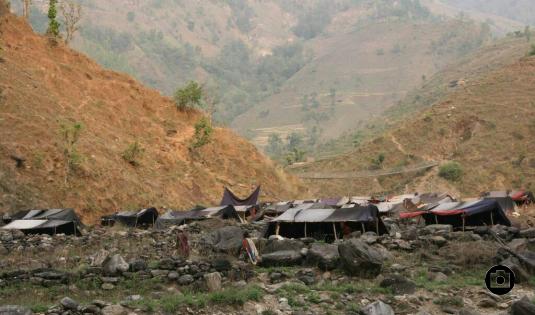

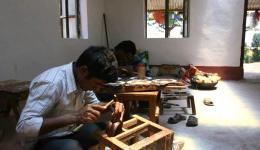
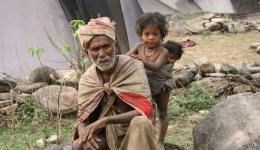
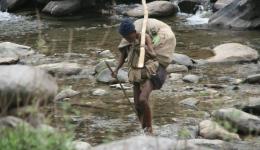
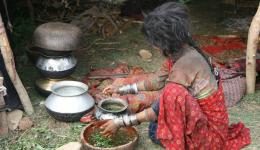
Comments(0)
Add new comment